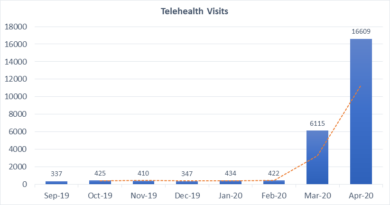Gastro Health Use of Novel Capsule for Remote Ingestion Increases Telemedicine Capabilities During COVID-19
By Javier Parra, M.D., Gastroenterologist, Gastro Health
The COVID-19 pandemic is the driving force of many modifications, temporary and permanent, which have ultimately changed the way we deliver health care outside of an office setting.
As the pandemic evolved, we at Gastro Health – being one of the nation’s largest networks of gastroenterology practices – adapted by making our offices and endoscopy centers compliant with CDC guidelines, provided enhanced PPE for our physicians, mid-level practitioners, and staff, as well as adapted our offices to account for socially distant health care delivery.
Part of that adaptation included being one of the first in the nation to change the way we utilize capsule endoscopy. In September of 2020, the U.S. Food & Drug Administration (FDA) announced it would allow the at-home administration of the CapsoCam Plus® for eligible patients. The CapsoCam, a small bowel capsule endoscope, is intended to visualize the small bowel mucosa in adults and may be used as a tool in the detection of abnormalities of the small bowel.
The at-home, remote use of CapsoCam has allowed Gastro Health to further comply with CDC guidelines, reduces exposure of patients and staff to infection, and has made office space and physician time available for patients whose conditions require them to be examined in person.
The main driving force behind the CapsoCam’s efficiency is the cloud-based technology that allows for remote reading of results. Without the need to carry a laptop and a dedicated VPN connection, Capsocam provides gastroenterologists with the freedom of a HIPAA-compliant web connection, which has continued to evolve into one of the most advanced in the industry so far.
Furthermore, remote reading obviates the need for in-person encounters that provide a safety measure for both the patient and their physician, and eliminates the time spent downloading and, at times, troubleshooting hard drive issues.
As opposed to other capsule endoscopies, Capsocam Plus offers a 360-degree visualization of the lumen of the small bowel while recording high-resolution images and data. This level of detailed imaging allows for greater diagnostic capabilities.
Before the onset of the COVID-19 pandemic, Gastro Health performed more than 120 of these capsule endoscopy procedures, which began as in-office ingestions. However, once we entered a pandemic, office visits were halted to adapt our physical spaces to CDC guidelines and install more safety and preventive measures.
The FDA’s approval of the CapsoCam for remote ingestion allowed us to develop further safety protocols where patients can be screened through a telehealth visit or phone conversation to determine their remote ingestion eligibility. Once a patient meets the criteria, instructions are given remotely and the capsule kit, along with the recovery hardware, can be mailed to the patient.
As we look at the future of health care and how it will continue to evolve, Gastro Health continues to look at the use of technology as a method of providing a safer and more efficient delivery of care. Part of this will include evaluating the expansion of this technology to gastrointestinal disorders. Communication and collaboration between technology partners, health care providers, venture capitalists, and insurance companies will prove essential in adapting to the changes in how health care is delivered.



